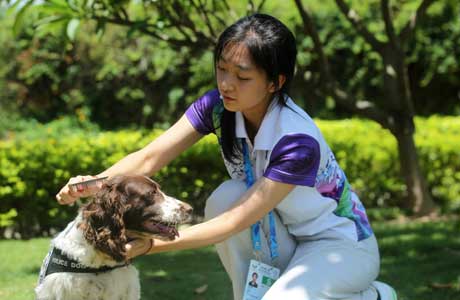Society
A nose for trouble
Updated: 2011-08-23 08:02
By Shi Yingying (China Daily)
|
Gui Lin combs the fur of her patrol dog, Fuqi, in the morning before they start work at Shenzhen Universiade, which closes on Tuesday. Photos by Cui Meng / China Daily |
The Universiade's English springer spaniel sniffer dogs may seem affable but know exactly what explosives and drugs smell like. Shi Yingying reports.
Yu Na has been walking her 4-year-old English springer, Xiaobao, or "little darling", through the Universiade's venues every day. His white and black coat and big eyes stop many in their tracks, who often bend down to give him a pat.
But Xiaobao is no playmate. He's a police dog making sure the games conclude on Tuesday without a hitch. And Yu, his trainer, is one of the nation's first policewomen to work with sniffer dogs.
"In 2003, when my work unit was looking for volunteers to join the first batch of policemen to partner work dogs, they only wanted six women for the Olympics," the 29-year-old Beijing native says.
"I have always loved dogs but was not allowed to raise one in my childhood as my family felt we could not take care of it," she says. "I remember that even the day before I applied to be a police woman working with patrol dogs, I asked my mom, 'Can we have a dog at home, please?' She once again said no, without any hesitation, and I told her, 'Then I will have one at work'."
After a year's training at Nanjing's police dog base on how to guide her dog to detect drugs and explosives, Yu joined the security apparatus for the Beijing Olympics and the Guangzhou Asian Games.
For Yu's colleague Gui Lin, who is skinny and short, handling a large breed police dog is a challenge.
"Although we have worked with much bigger dogs at school, such as the German shepherd and Belgian Malinois," says Gui, a 24-year-old police woman who recently graduated from the China Criminal Police College in Shenyang, "There's no denying that girls are at a disadvantage when training a large dog that weighs as much as us - 50 kg".
Luckily, Gui got to work with the relatively smaller springer after graduation. "Many people are afraid of big dogs, especially when we take them out to public spaces such as a shopping plaza - they sometimes scream in panic," says Gui.
"But the English springer is more affable and it feels like he is playing with you, when actually he is sniffing you out for possible drugs.
"It's hard not to like the English springer."
Besides avoiding the use of the bigger breeds, all the policemen and women working with patrol dogs for the Shenzhen Universiade are dressed just like other volunteers
"Volunteers are required to wear green T-shirts and we have similar ones, except they are purple," Yu says. "We don't want to make people nervous."
When a sniffer dog suspects an object is an explosive, it will just draw back and sit or lie down.
"You wouldn't want it to step on something and make it explode," says Liu Qing, deputy director of Kunming Police Dog Base's Public Security Department. "The dogs are trained to contain their excitement when they find something and stay calm."
Liu, who is also Gui Lin's teacher, says the selection of pups to be trained as sniffer dogs is done carefully.
"We take these 2- to 3-month-old puppies to someplace they are unfamiliar, such as the outskirts of Shenzhen, and observe them," Liu says.
"Those whose first response is to look up to explore their surroundings, are the ones that rely more on their eyesight; the ones that start off by sniffing the ground, are the ones we go for."
The pups are then put through their paces right away, but the trainers ensure they are not too harsh on them.
"At first, we play with them, and expose them to toys with different smells. The more serious training kicks in when the dogs are about 6 to 7 months old and lasts about one year," he says.

Specials

Biden Visits China
US Vice-President Joe Biden visits China August 17-22.

Star journalist leaves legacy
Li Xing, China Daily's assistant editor-in-chief and veteran columnist, died of a cerebral hemorrhage on Aug 7 in Washington DC, US.

Hot pots
Tea-making treasures catch the fancy of connoisseurs as record prices brew up interest
